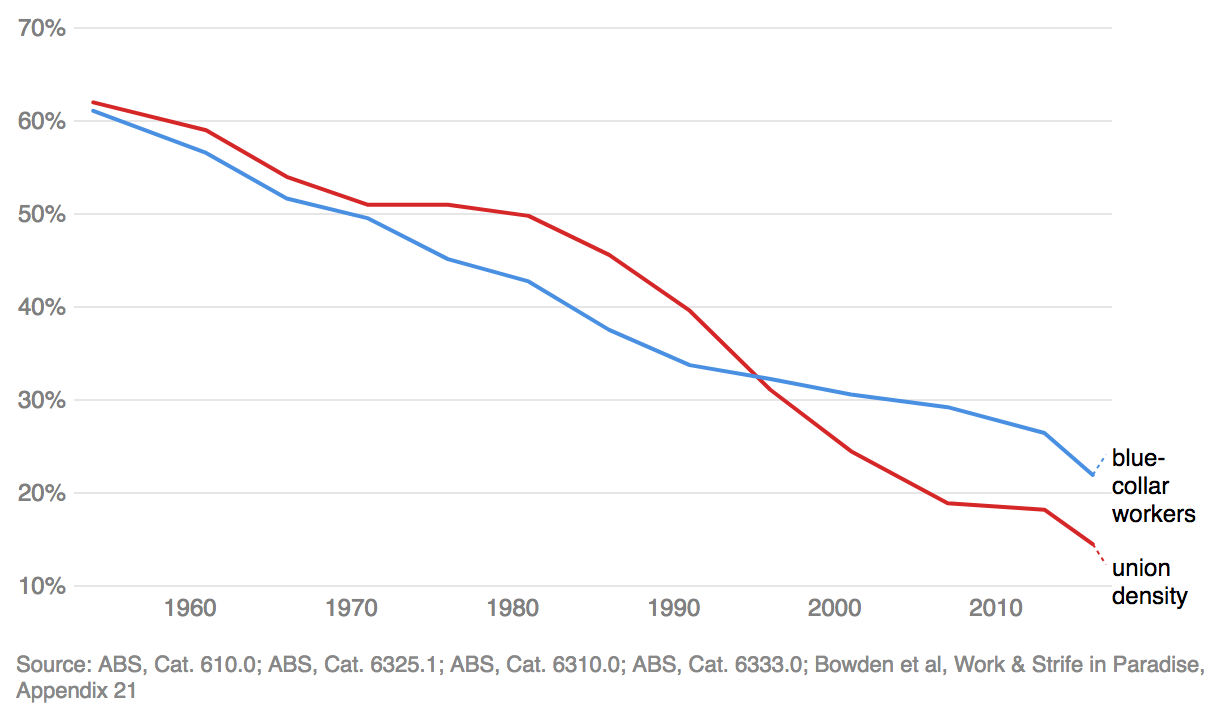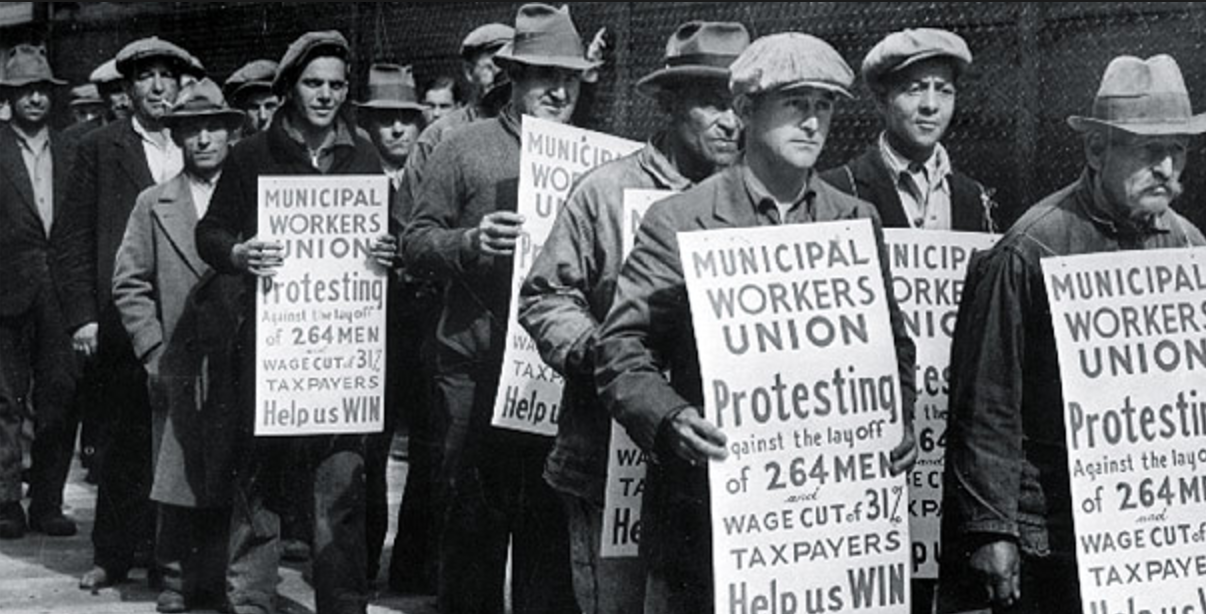
In a largely information-based work society, it’s easy to forget the important role unions have played in creating a civilised society. Things we take for granted like reasonable work hours, fair wages, workplace health and safety and even low cost retirement superannuation programmes. I’ve never been a part of a union – my work has typically never had union representation. But I’m starting to wonder if they’ll even exist in the near future. These numbers are very telling:
Union membership in steep decline – less than 15% of workforce currently:
- In 1960 it was 60%
- In 1980 it was 43%
- In 1990 it was 34%
- In 2000 it was 24%
- In 2010 it was 18%.
In the private sector only 10% of workers are members of a union and with manual labour declining due to automation, it is difficult to see a future for unions. That is of course, unless they start doing what all of us have to do: reinvent themselves and pivot to providing something non-union workers will need in the future.

The shift unions are missing:
Unions should start focusing on new types of labour – information workers and the gig economy. One of the biggest changes about to occur in our economy is the shift from employee to freelancer. Freelance work is no longer the stuff of the creative class, those who do weird and wonderful things no company needs day to day. We’ll all be doing freelance work in the near future. As employment ‘friction’ is rapidly being removed by technology, work will become more fluid. The growth of platforms to both display our credentials and help us connect with each other for projects is creating an inevitable and new work structure. This structure and the efficiencies it allows may well out perform the 200 year dominance of the firm. The latest ABS data shows that 30% of adults did some freelance work this month. And it is predicted that by 2027 there will be more independent workers than PAYG wages earners in Australia. It’s here we need to remember that back in the 1600s, fewer than 1% of workers the world over were employees – we all worked for ourselves. Employment may well be a temporary 200 year blip in the evolution of work as we return to the way it always was, as ‘the factory’ disappears from our lives.
The real opportunity for unions isn’t just to come in to negotiate conditions and wages for people. In all probability our market economy doesn’t want or need that. Instead, the opportunity for unions exists in becoming a quasi HR department for independent and freelance workers, to manage many of those things that we once had taken care of by employers when working inside a large corporation. They need to become a career partner in helping their members become more valuable. Demanding wage alone increases will only expedite the penetration of A.I and remove many of the members altogether.
Here’s some areas unions must address if they want to even exist 20 years from now:
The Gig Economy:
Sure, it used to be easier to gather the workers outside of a giant factory and convince them that they could better leverage their power to negotiate for better working conditions as a group, rather than as individuals. This can surely be done in a gig economy too. If Uber can aggregate labour, so can unions. They just need to modernise their recruiting techniques in the same way the gig economy startups have.
The Quasi HR department:
In the emerging gig and freelance economy, one of the major complaints is the benefits they lose as ‘non employees’. Think annual leave, safety regulations, work conditions, training and superannuation being organised on their behalf. Unions can fill this void. It may not be a traditional role for unions, but it is a protective and guiding role – and within the realms of what unions ought to do. It’s also possible that they could influence legislation for this purpose. Unions could teach freelancers how to price themselves (freelance workers are generally worth more than they think and undersell themselves by pricing too low). They could also invoice on behalf of freelancers to ensure they’re paid quickly. Freelancers could allocate to unions some of their income to organise their training, superannuation, tax and insurance. This would create a ‘float’ of money the unions could use to train and future-proof workers. Unions could create competitive digital products against the tech giants (Uber?) that their gig economy workers could own. Why give Uber 20% of every ride when gig economy workers could create a digital commons version of it they own? Blockchain, anyone?
Re-define Blue Collar:
Part of unions problem is their myopic view of labour which requires their representation, especially with white collar labour. In this arena unions generally only represent publicly funded or regulated industries including education and health sectors. They barely exist in media, finance, technology and other professional services. They should closely look at retail, call centres, and entry level corporate work. Salary workers have become the new Blue Collar – we could frame them as the White Collar Underclass. Most salary workers get paid for 40 hours of labour, yet work well over 60 hours per week. Examples of this include non-commission sales roles, administration, interns and pretty much all office-based entry-level work, even for university graduates.
Data As Labour:
And finally the biggest opportunity of all – data as labour. If you’re on the internet, you’re creating data. And that data, even if you see it as leisure or entertainment, it’s a form of labour. It’s work that you have done and it has significant value. It has created the fastest growing corporations in history, and now represents 5 of the 10 biggest companies in the USA. Anyone creating data is working for free and creating largesse for a few tech titans. Starting to gain traction is a movement whose philosophy is: “Our data is our labour and it shouldn’t be taken for free.” We’ve all been tricked into giving value away in exchange for access to human connection. If there was every an opportunity to redefine a market – then this is it.
In closing, unions need a startup mentality – find and disrupt new industries so they can help workers maximise the value they create. If they don’t, then it’ll just be another tragedy of the commons. I recently discussed this on radio – you can listen to it here.
– – –
If you want to future-proof yourself – then you might want to check out my latest book: The Lessons School Forgot.